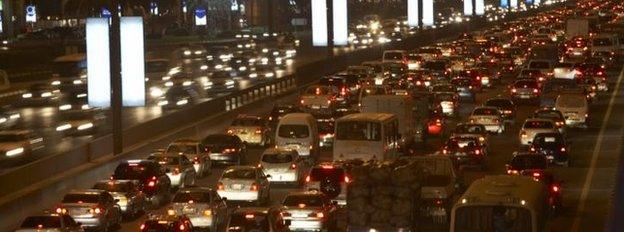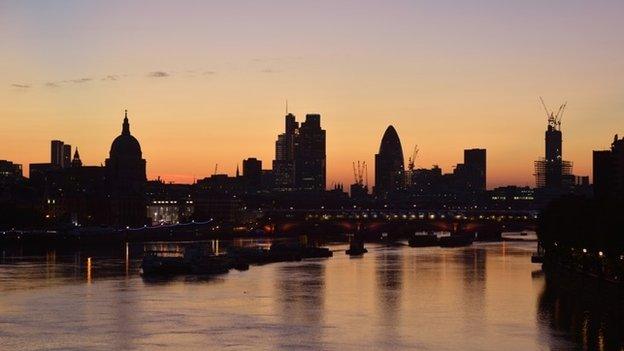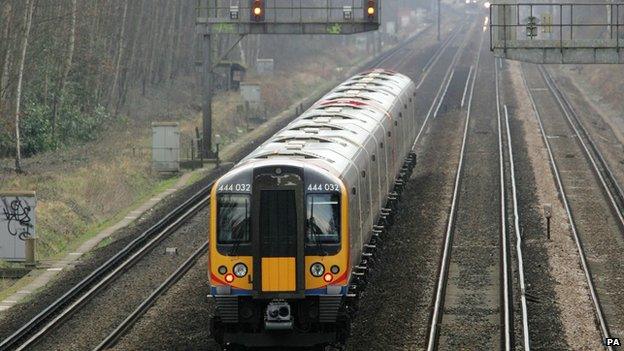Climate change remedies 'affordable', says global body
- Published

The report argues tackling climate change is relatively cheap
Politicians will put the world economy at risk if they fail to tackle climate change, a global commission has warned.
The body, a group of chief executives, former prime ministers and finance ministers, argues the cost of tackling climate change is modest.
Its report says adding 5% to the $6 trillion (£3.7tn; 4.6tn euros) a year due to be spent on power and transport projects could buy clean technology.
Critics say the report is too optimistic.
The Global Commission on the Economy and Climate was set up by seven governments and informed by research organisations around the world.

Creating sprawling car-dependent cities will lock in high pollution, the commission says
It is chaired by former Mexican President Felipe Calderon and advised by Lord Stern, former UK government economist and author of a previous review of climate change economics.
Its report says one key to safeguarding the climate is to change spending priorities for new infrastructure.
Former president of Mexico Felipe Calderon explains the findings
Creating sprawling car-dependent cities will lock in high pollution, whilst planning dense cities with good public transport will help keep emissions down, cut local pollution and improve quality of life, it says.
The commission says that by developing in this way, governments can collectively save $3 trillion over the next 15 years.
New economics
It says the costs of tackling climate change has fallen as new technologies have matured.
The prices of wind and particularly solar power have plunged whilst pollution from fossil fuels now reduces global economic output by 4%. This has changed the economics of climate change, the commission claims.
Its 300-page document says new technologies can help the billion people living in rural areas who are unconnected to electricity grids.

The commission said London was a "poster child" for best practice on climate change
New standards for equipment and cars - like the EU ban on high-wattage vacuum cleaners - can help drive cleaner products, it argues.
Lead author of the report, Jeremy Oppenheim, told BBC News: "The key message is that we can deliver better growth and tackle climate change at the same time - we don't need to choose."
As examples of best practice in cities he held up Brazil's Curitiba, Colombia's Bogota - and also London: "London is a poster child," he said. "We're redefining the city - we've got a public transport system that works; we've introduced congestion pricing for our roads; we're driving better productivity through our transport system - and that's helping the city as a whole."

Good public transport can help to reduce pollution, the commission says
The report is a successor to the Stern Review drawn up in 2006 which described climate change as the world's biggest market failure. The new report agrees, and labels urban sprawl the second biggest market failure.
The Stern Review was criticised for putting too high a value on the benefits to future generations of cutting emissions now.
Some economists argued that it made more sense to maximise the economy now and use our wealth to pay to clean up later. The commission believes this idea is reckless.
What is more, Mr Oppenheim says, the new report is practical not theoretical, and does not rely on long-term projections.
Professor Gordon Hughes, an energy economist at Edinburgh University, says the conclusions are over-optimistic.
The total costs of renewables to energy systems as a whole were greater than they appeared, he said.
He told BBC News: "I believe there is a significant problem with climate change, although the magnitude is hard to quantify.

The frequency of "extreme weather events" is increasing as a result of climate change, experts believe
"We in rich countries are on a development path which we may regret - but developing countries are now following along the same path. We cannot tell them 'do as I say, not as I do'.
"Choices can still be made but the idea that we can suddenly make changes to development patterns underway is assuming we have a blank slate and that people are prepared to radically depart from current trends - and that's not plausible."
But Mohamed Adow, a Kenyan working for Christian Aid, told BBC News: "Developing countries are seeing the effects of climate change for themselves in the form of extreme weather events. Many leaders are looking for a new way of doing things that doesn't involve them contributing to the climate problem - if only they can get help to do that from the West."
The report's authors do acknowledge the scale of the political challenge. The authors, for instance, want a "fair" price on carbon pollution, but politicians often face uproar if they raise taxes on polluting industries or increase the cost of home heating.

The commission says pressure by drivers to keep cheap petrol often wins the day
They want to phase out subsidies to fossil fuels, which total more than $500bn a year compared with $100bn for renewables. But pressure by drivers to keep cheap petrol often wins the day.
The hope for firmer city planning in developing countries will be widely welcomed, but the authors agree it will have to overcome a lack of administrative capacity at local and national levels; corruption; a rush of rural people into slums; inertia; and business lobbying.
The Global Commission says the climate problem can be tackled with strong inspired leadership. Without this, the authors warn, CO2 will continue to acidify the ocean and temperatures could rise to a catastrophic 4C by the end of the century.
Members of the commission include: Nemat Shafik, Deputy Governor of the Bank of England; Paul Polman, Unilever chief executive; Chen Yuan, former chairman, China Development Bank; Annise Parker, mayor of Houston; Luisa Diogo, former prime minister of Mozambique; Angel Gurria, secretary-general, OECD; Chad Holliday, chairman, Bank of America; Ricardo Lagos, former president of Chile; Takehiko Nakao, president, Asian Development Bank; Eduardo Paes, mayor of Rio de Janeiro; and Sharan Burrow, general secretary, International Trade Union Confederation.
Follow Roger Harrabin on Twitter @rharrabin
- Published20 September 2013
- Published14 September 2014

- Published9 September 2014

- Published1 September 2014
